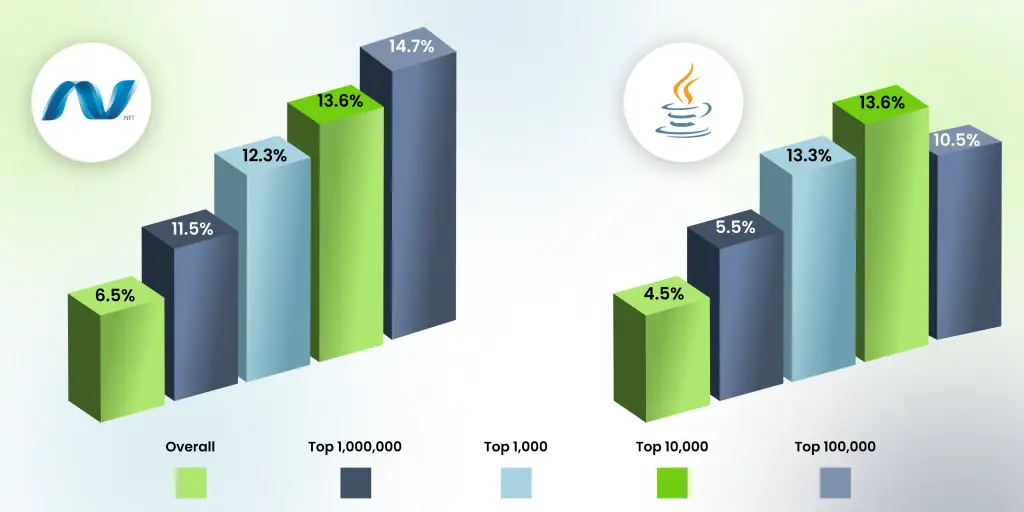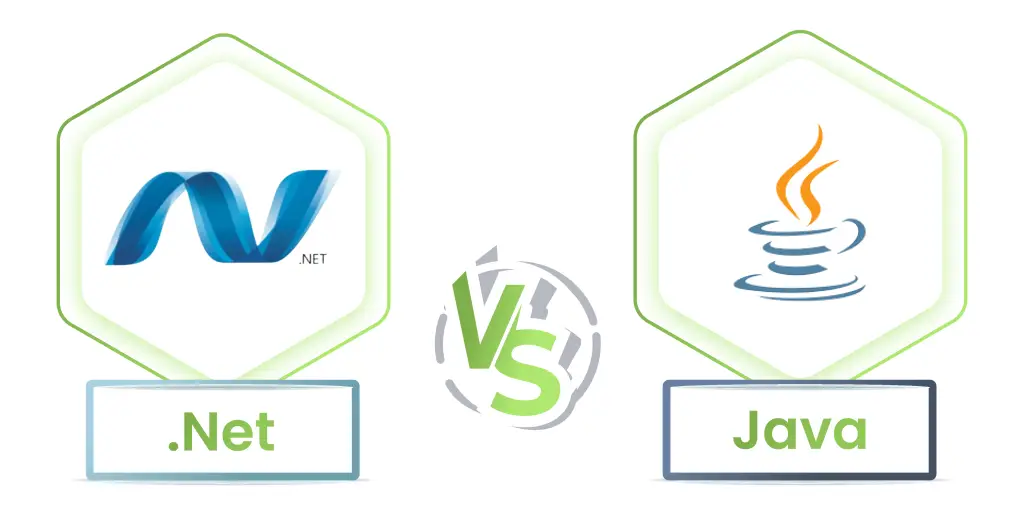There has always been a long battle in choosing between .NET and Java, two of the most popular programming languages. Deciding the best one depends upon various factors which we are going to discuss in today’s article. But before hopping to the comparison, it is crucial to understand why choosing the right programming language in 2024 is important for your business.
Importance of Choosing The Right Programming Language
- In software engineering, choosing a programming language is a critical decision for any firm. The suitable language adds to a streamlined development workflow, resulting in a robust software solution that allows for quick and efficient debugging, documentation, enhancement, and maintenance.
- Selecting inappropriate language, on the other hand, can lead to failure in one’s overall project.
- With vast options available in the market, selecting the right one can be a challenging task. Comparing the features and syntaxes of various languages can be difficult.
- Therefore it is necessary to consider the targetted platform, production time, community support, programmer’s experience with the language, and most importantly, the current popularity of the language.
NET vs Java: Main Difference Between The Two
Though both Java and .NET provide numerous benefits for developing complex commercial applications, the main distinction between them is that Java is interoperable with any operating system, whereas .NET focuses on interacting with various versions of Windows. Java was first established in the year 1995 at Sun Microsystems whereas .NET was founded in 2002 by Microsoft.
As discussed above, knowing the current popularity and developer’s preference is important to decide between popular programming languages. So let’s go through some of the key market insights and find which language is widely used in today’s competitive arena.

According to StackOverflow, .NET is the most popular framework and library with 34.55% of the votes.
Java was considered popular ranking 6th in the survey with 33.27% of the total votes.
- Many developers have recently converted from Java to .NET as .NET and its community have grown in popularity. Developers who are adept in both can profit from learning about these data; however, before we compare the two, we must first grasp what each platform has to offer.
NET vs Java: Head-To-Head Comparison
| Factors | .NET | Java |
|---|---|---|
| Supported Languages | Supports over 20 languages like C#, VB.NET, C++, .NET, PHP, Ruby & more | Groovy, PHP, Ruby, Python, Java, JavaScript, and many more |
| Operating Systems | Windows | Multiple |
| Web Application and Frameworks | Spring.NET and ASP.NET MVC | Spring Boot and Spring |
| Popularity | 2 million .NET developers globally | 10 million Java developers globally |
| Security | It’s an open source | Java had issues with its security features |
| Performance | .NET is faster than Java | Java offers a lot of tools that scale the performance |
| Ease of Learning | Microsoft provides documentation and educational material for .NET | Java provides more documentation and educational materials |
| Cost of Development | Annual salary: $114,500 | Annual salary: $112,430 |
| Licensing | .NET has no licensing fees as it is a free developer platform | Java offers free versions and updates, but some features must be purchased |
| Popular Companies | Samsung, Microsoft, Intel, Cisco, Dell | Amazon, Google, Netflix, Uber, Airbnb |
| Integrated Development Environment | Microsoft Visual Studio, MonoDevelop, Rider | Eclipse, Oracle JDeveloper, Oracle NetBeans, and IntelliJ Idea |
NET vs Java: Other Factors To Consider

1) Scalability
When it comes to creating complex large-scale applications, both technologies will be equally effective. Given this, the.NET framework and Java are frequently used to develop enterprise-level applications. In this instance, personal preferences and project specifics typically impact technology selection.
2) Performance
Java is a developer-centric platform; code conversion is not required until the code is executed. Java can translate it using machine learning. Then, on the other side, the .NET is assembled and performed on the machine. As a result, C# performs better in runtime scenarios.
Before Java 7, no support existed for simple and simplified data structures or switch situations. When it comes to interoperability, both.NET and Java are equally capable, and they are compatible with most operating systems and devices.
3) Speed of Coding
Software developers who choose the Java programming language utilize a variety of threads to facilitate the process of managing and executing instructions in the sequence. However, in terms of speed, the .NET framework is the undisputed leader in this industry. It also includes numerous components that can be reused because it is an object-oriented platform, so when comparing the time required to construct identical programs in both languages, it will take less time, which is the primary reason why developers prefer Java.
On the other hand,.Net is an object-oriented technology that allows you to reuse many components written for the same program. So, when comparing Java and .NET, it is clear that .NET takes less time. So it is safe to state that .NET is the clear winner in terms of coding speed.
4) Tools
.NET uses natively compiled languages like C# and C++. Using.NET tools from the Microsoft Developer Network, a.NET software developer can produce faster results while using less memory than Java. .NET also supports code optimization, which can enhance performance and efficiency by reducing the number of lines of code used.
Shorter code also saves time on code maintenance and troubleshooting. Such features are undeniably tempting to both developers and users. We went over IDEs in length in the last section because they are also regarded as vital tools that may be integrated with other third-party apps and apps. So, in this area which tools perform the best among both—Java and .NET, .NET is undoubtedly the winner.
.NET vs Java: Who Wins The Ultimate Battle
Java is one of the popular programming languages which is often considered the future of web application development. Its robust framework, scalability, and integration capabilities with futuristic technologies make it an unrivaled voice for developers aiming at building cutting-edge applications.
However, things have changed after the arrival of the .NET framework. By providing ease of development, faster response, high performance, and community support, it has gained momentum, giving tough competition to existing programming languages. Some of the top websites have already been built with the .NET framework. The final decision of choosing your preferred language depends on one’s business requirements and other needs.
Conclusion
Both Java and .NET are popular development platforms, with their own set of advantages and disadvantages. Java shines in situations where flexibility is necessary, whereas .NET is better suited for web development with complicated user interfaces. Furthermore, in this architecture, the managed code runs at a considerably slower rate, leaving it reliant on Microsoft for any newer improvements and features. Understanding the above differences will greatly help you in finding the right programming language.
Whether you are looking for Java or .NET development solutions, Echoinnovate IT can help. Take the best guidance from our expert team of developers and find which programming language suits your business better in 2024.
To get the best web development services, contact us!
FAQs- NET vs Java: Who Is The Ultimate Winner In 2024
What are the key performance differences between .NET and Java in 2024?
NET offers superior performance through its native compilation and optimized runtime, while Java relies on its mature ecosystem and JIT compilation for performance gains.
How do the ecosystems of .NET and Java compare in 2024?
NET’s ecosystem is bolstered by Microsoft’s backing, providing seamless integration with Azure and a robust set of tools. Java’s ecosystem, on the other hand, boasts a vast array of open-source libraries and cross-platform compatibility.
Which language has better community support in 2024, .NET or Java?
Java maintains a large and active community worldwide, fostering innovation and providing extensive documentation and support. However, .NET’s community is rapidly growing, driven by Microsoft’s initiatives and the adoption of .NET Core.
What are the latest trends shaping the future of .NET and Java in 2024?
In 2024, .NET is witnessing a surge in adoption, fueled by advancements in .NET Core, cross-platform compatibility, and increased support for cloud-native development. Java, on the other hand, continues to evolve with updates to the JDK, improved performance, and a focus on modernization efforts such as Project Loom and Project Panama.



